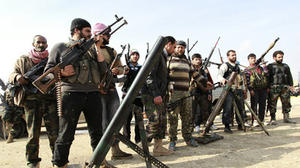SyriaU.S. military instructors training Syrian rebels in camps in Jordan
U.S. military sources said that American Special Operations forces and Special Force troops agents have been training small groups of Syrian opposition forces in Jordan. The training, conducted jointly by U.S. and Jordanian military instructors, has been going on for more than eight months now.

U.S. instructors have been training secular Syrian rebels // Source: sadkhabar.ir
U.S. military sources said that American Special Operations forces and Special Force troops agents have been training small groups of Syrian opposition forces in Jordan. The training, conducted jointly by U.S. and Jordanian military instructors, has been going on for more than eight months now (see “Syrian rebels trained in handling, securing chemical weapons,” HSNW, 10 December 2012). Fox News reports that there are about 100 American instructors, and that the rebels, who come from the secular militias within the broad coalition of militias fighting the regime of President Bashaar al-Assad, are grouped into classes of 50 or 60.
The goal of the training program is to strengthen the anti-Assad forces and, at the same time, strengthen the non-Jihadi elements in the rebel coalition.
Fox News says that Pentagon officials insisted that the American military instructors were in Jordan to train Jordanians, not Syrians. The AP reports that the Syrians being trained are not affiliated with the Free Syrian Army.
White House spokesman Josh Earnest said Monday the U.S. has “provided some logistical nonlethal support that has also come in handy for the Syrian rebels who are, again, fighting a regime that is not hesitating to use the military might of that regime against its own people.
“That is something we’re going to continue to work to bring to an end,” he told reporters.
The New York Times reported yesterday that the CIA was helping Arab governments and Turkey increase their military aid to Syria’s opposition in recent months, with secret airlifts or arms and equipment. The Times reports an airlift consisting of scale a year ago but has expanded steadily to more than 160 military cargo flights by Jordanian, Saudi, and Qatari planes landing in Turkish and Jordanian airports. The supplies are then trucked to the rebels by Jordanian and Turkish trucks.
While the military capabilities of the rebels increases, their political unity does not. On Sunday, the coalition’s president, Mouaz al-Khatib, resigned his position, blaming restrictions on his work and frustration with the level of international aid. Analysts note that Al-Khatib’s resignation comes only days after the opposition chose Ghassan Hitto, a Syrian-American who has been living in Texas for two decades, to head the coalition’s interim government.
